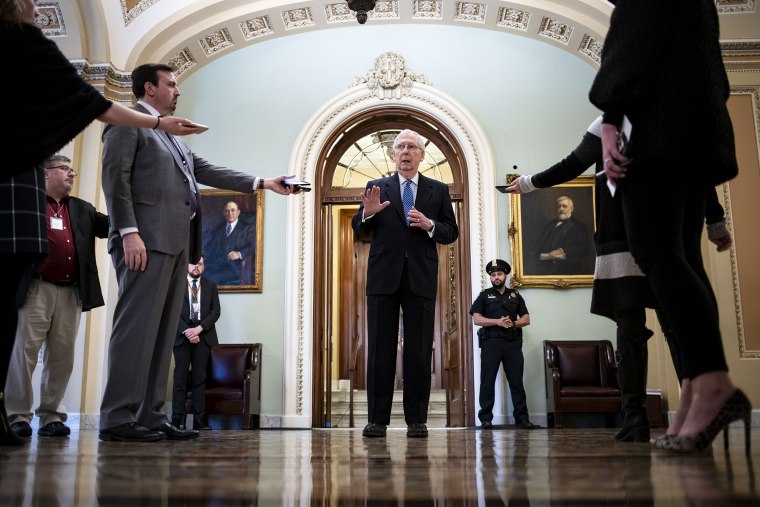U.S. House leaders, in coordination with Congress' Office of the Attending Physician, decided it wasn't yet safe to return to work next week. As Politico reported yesterday, Senate Majority Leader Mitch McConnell (R-Ky.) made the opposite decision -- and it's worth considering why.
The Senate majority leader is gambling that 100 senators can safely meet on the Senate floor and throughout the Capitol complex. Many of them will travel across the country for the Senate's reopening, risking exposure on airplanes and in airports. And 49 senators are aged 65 or older and at greater risk of the deadly disease, according to the Centers for Disease Control and Prevention. Plus, the senators' return will bring back hundreds of staffers and Capitol employees.
The health threat in the nation's capital -- a city where coronavirus cases are still rising -- is real, and by some accounts, members aren't entirely sure how they're supposed to stay safe.
On Wednesday, for example, Sen. Patty Murray (D-Wash.), a member of the Senate Democratic leadership, said, "I have not yet seen, personally ... a safety plan to protect those people who have to come back to the Capitol in order for us to do anything. Nor a plan to make sure that we are not spreading the virus ourselves or to the employees."
What's more, it's not altogether clear why the move is ostensibly necessary. To be sure, the Senate will soon be called to consider another economic aid package, but the floor procedures for the last couple of Senate votes on related bills did not require the full attendance of all 100 members.
As Sen. Chris Murphy (D-Conn.) put it, "If we're doing oversight work or we're passing a relief bill, then you can credibly make the case we are essential employees. But there's no reason to bring the Senate back to make conservative radio hosts happy. That's a dereliction of duty."
The Connecticut Democrat's point about the political circumstances appears to have real merit. McConnell hasn't been explicit about why he's so eager to take this gamble, but Republicans have signaled their intention to move forward with consideration of a seemingly unqualified judicial nominee (Justin Walker), a seemingly unqualified Federal Reserve nominee (Judy Shelton), and a literally unqualified director of National Intelligence nominee (John Ratcliffe).
Is it worth putting senators at risk to advance White House picks like these? It's tough to make the case.
Complicating matters, Politico had a related report yesterday, noting that Dr. Brian Monahan, the Capitol's attending physician, said that coronavirus tests will be available for congressional staffers and senators who are symptomatic, but there is insufficient capacity to proactively test all 100 senators.
Donald Trump has said more than once of late that anyone who wants a virus test can get one. Evidently, that's not true -- even in the U.S. Senate.

